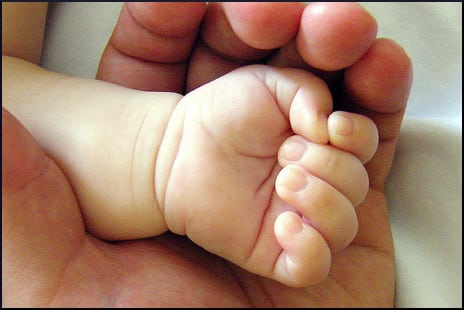In Colombia, a charitable organization called Gorditos de Corazon (Chubby Hearts) received a heartfelt plea from the unemployed mother of 10-month-old Juanita Valentina Hernandez. For reasons that no one yet understands, the little girl weighs as much as a 5- or 6-year-old child. Her mother, Sandra Franco, is a slender woman who is at a loss to explain her baby’s constant weight gain. All she knows is that an infant who started out on the thin side began to look suspiciously bulky within two weeks.
At birth, young Juanita weighed around 6 pounds, but now weighs 44 pounds and is unmistakeably morbidly obese. The medical team looking into her case desperately wants to halt the inexplicable weight gain and prevent her from developing any of the numerous conditions that could possibly result.
The doctor who founded the Gorditos de Corazon charity, Salvador Palacio Gonzalez, has met three such babies in the past year – all are under a year old and weigh more than 20 kilograms, or 44 pounds.
The concerns, of course, are well known. A morbidly obese child is at risk for a number of alarming problems. These words are from Dr. Kristen Nadeau of the University of Colorado Cancer Center, who specializes in pediatric endocrinology:
Childhood obesity may itself be enough to cause outcomes including metabolic syndrome, cardiovascular disease, type 2 diabetes and its associated cardiovascular, retinal and renal complications, nonalcoholic fatty liver disease, obstructive sleep apnea, polycystic ovarian syndrome, infertility, asthma, orthopedic complications, psychiatric disease, and increased rates of cancer, among others.
That paragraph begins with the words “childhood obesity itself” for a reason. Even if a child who started out obese is able to lose weight later, and to maintain a normal adult weight, it is feared that childhood obesity can leave an indelible mark that affects the entire life cycle. This theory is speculative, because many victims of the childhood obesity epidemic are still young, but researchers have seen enough clues to raise plenty of red flags.
The need for conscientious longitudinal studies is seen as crucial, because following these kids through life – even if they lose weight – could verify these scientists’ suspicions by showing long-term results that are devastating. Dr. Nadeau speculates that because the maturing bodies of children are especially vulnerable, childhood obesity could change the whole metabolism of the body in “long-lasting and profound” ways that can never be corrected.
Once childhood obesity has established itself, reversing the condition is very difficult, and this knowledge highlights more strongly than ever the urgent importance of prevention and early intervention. Literally, every minute counts.
Your responses and feedback are welcome!
Source: “This ten-month-old is morbidly obese – and no one knows why,” Metro.co.uk, 01/14/15
Source: “Health effects of childhood obesity may be long-lasting and profound,” News-medical.net, 02/14/14
Image by Adriano Aurelio Araujo


 FAQs and Media Requests:
FAQs and Media Requests: 











